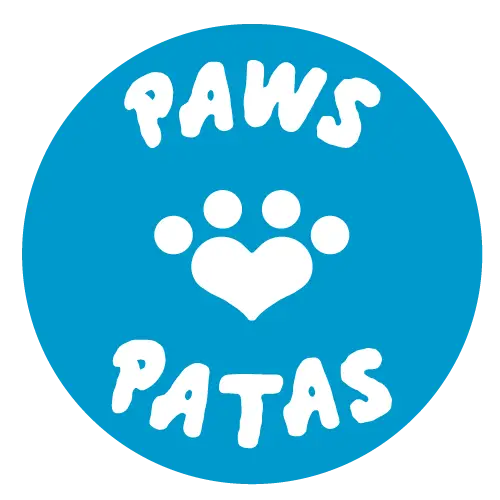Thank you to our partners whose support makes our work possible




Frequently asked questions
Can I come and walk the dogs?
Yes! We welcome dog-walking volunteers.
You can usually walk our dogs 7 days a week between 9:00 and 13:00, and during the summer months between 9:00 and 11:00. It’s a great way to give the dogs exercise and companionship — and it’s good for you too!
To get started, please click below to register your interest:
Can my children work at the shelter?
Children are only allowed to help at the shelter under special circumstances, and they must be supervised by a parent or guardian at all times.
If your child is interested in volunteering, please let them complete the volunteer form below and make sure to tick the “under 18” box.
Please note
Children under the age of 18 are not covered by our Public Liability Insurance
Can PAWS-PATAS pay to have my dog spayed?
PAWS-PATAS receives no government funding, and unfortunately, we do not have the resources to help with the cost of neutering owned dogs.
We recommend speaking to your local vet, as some may offer payment plans or discounts in certain cases.
Thank you for understanding — and for being responsible about neutering.
Can you come and collect this unwanted cat / kitten(s) and take them away?
At PAWS-PATAS, we run a small cattery with limited space, so we can only admit animals when we have room and the right resources in place. We are only able to take in cats that are homeable — meaning they can be adopted and are not feral, as experience has shown that older feral cats are extremely difficult to domesticate.
If you are in our local area, please help us assist you by completing the Cat admission form. One of our volunteers will contact you as soon as possible to discuss the next steps.
Can you come and collect this sick / hurt / injured animal?
The Ayuntamientos are legally obligated to collaborate with an animal association for the care of abandoned and injured animals in their municipality. If you find a sick or injured animal, you should notify the local Ayuntamiento and, if possible, send them a photograph.
At the same time, please take proactive steps to help the animal. Whenever possible, take the animal to the nearest vet for assessment and urgent care.
PAWS-PATAS do not employ any vets or nurses, nor do we have the resources to deal with sick or injured animals in an emergency.
Can you help with neutering a cat?
Under Articles 38 and 39 of the Animal Welfare Act 2023, local authorities are responsible for managing and controlling stray animal populations.
At PAWS-PATAS, we support this effort through our Trap, Neuter, Return (TNR) programme — a humane and effective way to reduce the number of stray cats in our communities.
To learn more about how TNR works and how we may be able to help, please click the button below:
Do you have any special breed puppies / kittens?
Most of the cats and dogs in our care are mixed breed — the result of abandonment and uncontrolled breeding. While we occasionally rescue animals that may resemble a particular breed, this is rare.
What matters most is their personality, not their pedigree!
Click below to see the wonderful animals currently looking for loving homes:
Can you recommend a vet in my area?
We’re not able to recommend a specific vet, but we do work with several trusted veterinary clinics in our area.
To help you find the right one for your needs, please click below to view a full list of local vets:
Can I come and visit an animal?
Absolutely — we’d love for you to meet our animals!
However, please note that we do not accept walk-in visits at the shelter. Our volunteers are often very busy caring for the animals, so we kindly ask that you make an appointment in advance.
To schedule your visit, please contact one of the teams below.
Thank you for your understanding and support!
Would you like some old blankets, towels, or pillowcases?
Yes please — we’re always grateful for clean, used blankets, towels, and pillowcases. They help keep our animals warm and comfortable.
You can drop them off at your nearest fundraising outlet or bring them directly to the shelter.
How do I report an abused animal?
For Non-Medical Emergencies: If you witness animal cruelty or animals in distress, please contact Seprona (the Wildlife and Environmental Protection Unit of the Spanish Civil Guard).
Seprona
Call 062
seprona@guardiacivil.org
- You can also download the Alert Cops app, which can pinpoint your location when you send a message.
For Medical Emergencies: If an animal is in need of medical treatment, please contact your nearest veterinary clinic. PAWS-PATAS does not have veterinary staff at its facilities and is not equipped to provide medical care.
Thank you for helping ensure the well-being of animals in need!
Alert Cops
What do I need to do to take my dog back to the UK?
Before Traveling
1. Vaccinations
- Your dog must be vaccinated against rabies, and the vaccination must be up to date.
- If it’s the first rabies vaccination, you must wait 21 days (3 weeks) before entering the UK.
- Other vaccinations like parvovirus, leptospirosis, and hepatitis are also important and should be kept current (though rabies is the key requirement for entry).
2. Microchip:
- Your dog must be microchipped (already done if adopted from us).
3. Pet Passport:
- Your dog should have a valid passport that includes details of the microchip and all vaccinations.
Pre-Travel Vet Appointment
- Timing: Book a vet appointment no less than 24 hours and no more than 120 hours (5 days) before arriving in the UK.
At the vet:
The vet will check your dog’s health to confirm it’s fit to travel.
The vet must administer a tapeworm tablet (Echinococcus treatment).
The treatment and health check must be recorded in the dog’s passport, specifically in the Echinococcus Treatment section.
Other Important Notes
- You cannot bring more than five dogs, cats, or ferrets, unless you’re travelling for a competition (special rules apply).
If you’re not travelling with your dog personally, you can use a pet transport company, like:
Contact for Further Advice
UK Pet Travel Helpline
Email: pettravel@apha.gov.uk
Phone: 03000 200 301 (Mon–Fri, 8:30am–5pm)
More Info
You can find the official, detailed steps here:
Bring your pet to Great Britain: step by step guide – www.gov.uk/bring-your-pet-to-great-britain
I cannot keep my dog anymore, can PAWS-PATAS take them?
We’re here to help
We know that parting with a pet is never easy — thank you for taking the responsible step to seek help.
Please note
- Before any animal can be accepted into our shelter, they must be tested for potential transmissible diseases to protect the health of the animals already in our care.
- In some cases, we may need to find a foster carer for your animal while awaiting test results.
- As a small, volunteer-run team, we may not always have immediate space or resources available, but we’ll do our very best to support you and your pet.
Need Us to Take the Animal In?
If you adopted the animal from us, please complete our Surrender form
If you did not adopt from us, please complete our Animal Entry form.
A volunteer will be in touch as soon as possible based on current capacity.
Can You Keep the Animal a Little Longer?
If you’re able to care for your pet temporarily, we can help by advertising them for adoption on our social media and website.
Please complete the Advertise form.
Thank you for your compassion and understanding.
With your help, we can give your pet the best possible chance at a happy, loving future.
I have found a kitten / kittens - what do I do?
Newborn kittens are best cared for by their own mothers.
Her milk provides vital antibodies (colostrum) that protect kittens from disease. Removing them too early can seriously harm their health.
Before you move them
Check for the mother cat.
She may be nearby, scavenging for food. Even if you can’t see her, don’t assume the kittens are abandoned—she’s likely returning soon.Kittens may be in the process of being moved.
Cats often move their kittens one at a time. If you see only one or two, wait and watch from a distance.Do not disturb or touch the kittens unless absolutely necessary.
If you must handle them, avoid transferring your scent—feral mothers may reject kittens that smell unfamiliar.If the kittens seem cold or exposed:
Gently wrap them in a soft cloth
Place them in a safe, shaded, and dry area
Make sure the mother can easily find and reach them
Do not remove them unless the mother has not returned for several hours, or if the kittens are clearly sick or in danger.
Concerned for their health?
Contact a veterinarian for guidance. Kittens that are cold, weak, or injured need professional care.
If the mother is still producing milk
Taking her kittens can cause her to develop mastitis, a painful infection that requires antibiotics. If untreated, it can lead to sepsis and death.
Important note about our team
We’re a small group of volunteers, and few of us are experienced in bottle-feeding newborns. It may take us time to find a trained foster carer, so keeping the kittens with their mother is almost always the best choice.
I have found a cat, dog / puppy – can you take it in?
We truly want to help
but please understand that we are a small, volunteer-run team, and may not always have the space or resources to take animals in immediately.
Please Consider
Not all animals are suitable for rehoming.
Ask yourself:
- Is the animal tame or socialised?
- Could it be a stray or feral?
- Is it part of a local cat colony?
Some animals, especially feral cats, may be better supported through TNR (Trap–Neuter–Return) rather than being rehomed as pets. If this applies, we may be able to assist.
Want us to take the animal In?
Please complete our Animal Admission Form using the link below.
A volunteer will review the details and get in touch as soon as possible, depending on space and availability.
Can you temporarily care for the animal?
If you’re able to care for the animal for now, we can advertise them on our social media and website to help find their owner or a new home.
We may be able to assist through our Trap–Neuter–Return (TNR) program.
Learn more here:
Thank You for Caring.
Your kindness truly makes a difference. Together, we can give lost, stray, and abandoned animals a second chance at life.
What are the opening hours for the shelter?
Opening hours
Please note
We are open to visitors by appointment only to ensure we can give you the time and attention you need, and that the right volunteer is available.
If you’d like to visit, please get in touch with the relevant team in advance:
Tuesday to Saturday: 10:00 – 14:00
Closed on Sunday and Monday
Please note
(These hours do not not apply to our dog walking volunteers).
When are the fundraising outlets open?
Is there anything else we have not mentioned?
Please click below to contact us with your enquiry.
Can you transport my cat or dog to the UK or another EU country?
No, unfortunately we are not able to offer transport services for pets, nor can we recommend specific transporters. Many of the companies we work with have strict criteria regarding species, age, and drop-off locations. For the most up-to-date options, we suggest doing a general search online to find a suitable transporter that meets your needs.




